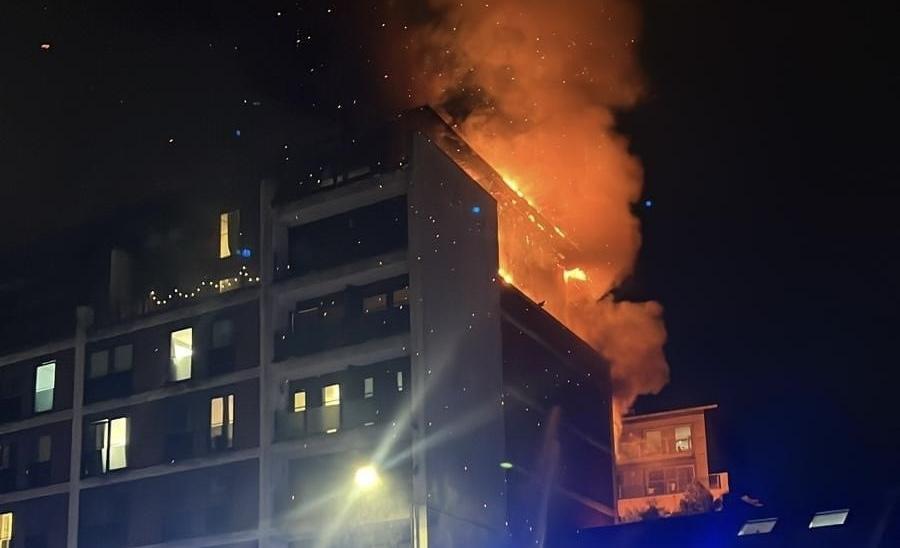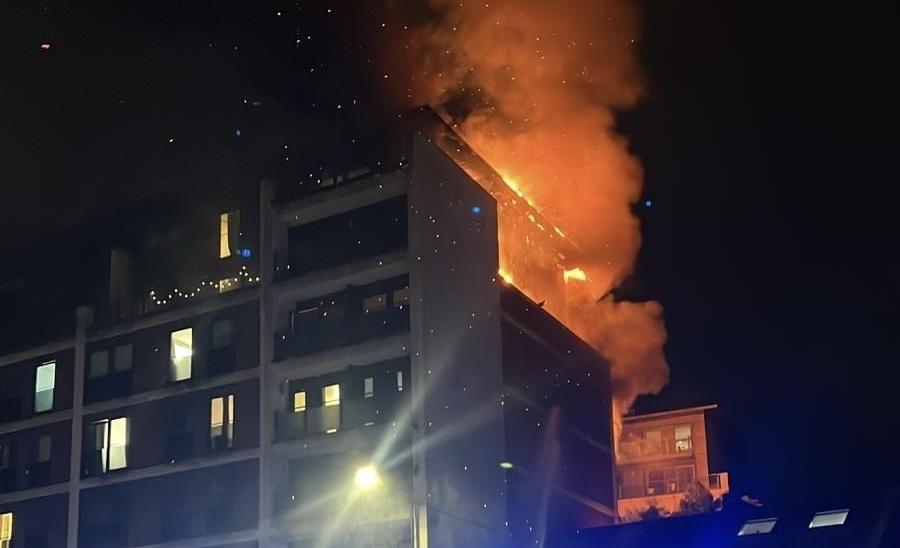From artisanal crepes to rebellious cheesecake waffles, Reading's breakfast rebels are transforming morning meals. These seven spots will revolutionize how you start your day.
Echoes of Grenfell: Fire at Mosaic Apartments Raises Cladding Concerns
A recent fire at Mosaic Apartments on Slough High Street has reignited concerns about flammable cladding in residential buildings. The incident, which occurred on September 6, 2024, drew immediate comparisons to the tragic Grenfell Tower fire, sparking debates about building safety and responsibility.

Questions of Accountability Loom Large
As images of the fire-damaged Mosaic Apartments building circulate, residents and local authorities are left grappling with a pressing question: Who is responsible for the presence of potentially dangerous cladding materials? This incident has thrust the issue of building safety back into the spotlight, prompting a renewed examination of regulations and oversight in the construction industry.
The Fire Incident and Immediate Response
On September 6, 2024, a fire broke out at Mosaic Apartments on Slough High Street, sending shockwaves through the community. The incident immediately drew comparisons to the tragic Grenfell Tower fire, reigniting concerns about the use of flammable cladding in residential buildings. As images of the fire-damaged structure circulated, residents and local authorities were confronted with the stark reality of potential safety hasards in their midst.
The fire at Mosaic Apartments has thrust the issue of building safety back into the spotlight, prompting a renewed examination of regulations and oversight in the construction industry. The incident has raised critical questions about the materials used in the building's construction and the potential risks they pose to residents.
Investigating Responsibility and Accountability
In the wake of the fire, a pressing question has emerged: Who is responsible for the presence of potentially dangerous cladding materials at Mosaic Apartments? This inquiry extends beyond the immediate incident, touching on broader issues of accountability within the construction and property management sectors.
The investigation into the fire's cause and the building's safety features is likely to involve multiple parties, including developers, contractors, building inspectors, and local authorities. As the community seeks answers, the incident has sparked a broader debate about the effectiveness of current building regulations and the need for stricter enforcement measures.
Echoes of Grenfell: Lessons Learned and Challenges Ahead
The parallels drawn between the Mosaic Apartments fire and the Grenfell Tower tragedy underscore the ongoing challenges in addressing fire safety in high-rise buildings. The Grenfell disaster, which occurred in 2017, led to significant changes in building regulations and a nationwide review of cladding materials. However, the recent incident in Slough suggests that concerns about flammable cladding persist, raising questions about the pace and effectiveness of remediation efforts across the country.
As investigations into the Mosaic Apartments fire continue, there is likely to be renewed scrutiny of the measures implemented since Grenfell. This incident may serve as a catalyst for further reforms in building safety protocols and a reevaluation of the materials approved for use in residential constructions.
Community Impact and Resident Concerns
The fire at Mosaic Apartments has undoubtedly had a significant impact on the local community. Residents of the building and neighboring properties are grappling with concerns about their safety and the potential need for temporary relocation. The incident has also raised anxiety among residents of similar buildings in the area, prompting calls for comprehensive safety audits and transparent communication from property managers and local authorities.
As the community comes to terms with the event, there is likely to be an increased demand for information about the safety measures in place at Mosaic Apartments and other residential buildings in Slough. This incident may lead to a broader conversation about residents' rights to information regarding the construction and maintenance of their homes.
Looking Ahead: Implications for Building Safety Policies
The fire at Mosaic Apartments is likely to have far-reaching implications for building safety policies in Slough and potentially across the UK. Local authorities may face pressure to conduct more rigorous inspections of existing buildings and to review their approval processes for new constructions. Additionally, there could be calls for greater transparency in the disclosure of building materials and safety features to prospective residents and property buyers.
As the investigation unfolds, the incident at Mosaic Apartments serves as a stark reminder of the ongoing challenges in ensuring residential building safety. It underscores the need for continued vigilance, robust regulations, and clear lines of accountability in the construction and management of high-rise residential properties.
Calls for Regulatory Reform
The Mosaic Apartments fire has intensified demands for a comprehensive overhaul of building safety regulations. Industry experts and safety advocates are urging policymakers to implement more stringent standards for cladding materials and fire prevention systems in high-rise buildings. There is growing support for mandatory regular safety inspections and the creation of a national database to track buildings with potentially hasardous materials.
Economic Implications
The incident has raised concerns about the potential financial impact on property values and insurance premiums in the area. Owners of similar buildings may face increased pressure to undertake costly renovations to ensure compliance with evolving safety standards. This could lead to a ripple effect in the local real estate market, affecting both residential and commercial properties.
Technological Solutions
In response to the fire, there is renewed interest in innovative fire safety technologies. Discussions are underway about incorporating advanced fire detection systems, smart building management platforms, and fire-resistant materials in both new constructions and retrofits. These technological advancements could play a crucial role in preventing future incidents and improving overall building safety.
Public Awareness and Education
The Mosaic Apartments fire has highlighted the need for increased public awareness about fire safety in residential buildings. Local authorities and fire services are considering launching educational campaigns to inform residents about fire prevention, evacuation procedures, and the importance of reporting potential safety hasards. This incident may serve as a catalyst for fostering a culture of safety consciousness among the general public.
International Perspective
The fire at Mosaic Apartments has attracted attention beyond UK borders, prompting discussions about building safety standards in other countries. International experts are closely monitoring the investigation and its outcomes, potentially leading to a global reassessment of high-rise building regulations. This incident may contribute to the development of more harmonised international standards for fire safety in residential structures.
